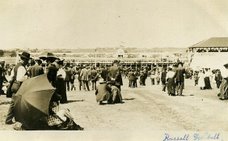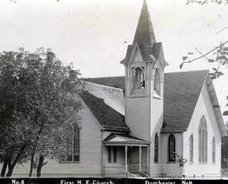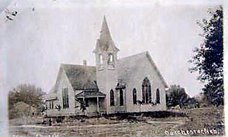
This is part two of our look back at paving debate of 1979 thirty years later.
The following story was published in the Lincoln Star on July 3, 1979 -- a few days after the paper's original story. (Friday's posting garned several comments. Click here to see them. Further commentary can be found here.)
Paving is Hot Topic in Dorchester
DORCHESTER, Neb. – What, in a town of 630 on a warm summer’s evening, does it take to get 120 people to a village board meeting? Paving.
That was about the only thing decided here Monday night as folks got together to discuss the only topic in town hotter than the temperature inside the community center. With the group apparently split about 2-to-1 against paving, emotions soared during the two-hour session. Yet, almost like a family spat, nobody was called anything worse than his first name – which happened repeatedly.
 Technically the session was called for the routine creation of three districts involving only four blocks of paving. But most of the argument centered on the “gap paving” that Mayor Bill Moser says they board probably will order in later.
Technically the session was called for the routine creation of three districts involving only four blocks of paving. But most of the argument centered on the “gap paving” that Mayor Bill Moser says they board probably will order in later.The mayor says even the gap total probably will not exceed four or five blocks, but opponents fear it will eventually checkerboard most of the town. They contend numerous older people as well as young home owners will lose their properties if the paved segments are put in.
“I lived on a farm and walked in both dirt and manure and it didn’t hurt me,” said Belva Johnson, cafe owner and outspoken opponent of the $21-per-front-foot paving. “If it wasn’t for dirt, how many farmers could have come to town and retired?”
That was one of several comments drawing applause. But so did a remark by proponent and retired farmer Hans Weber that “dirt streets don’t bring people into town.” Paving is “good for the town,” he continued. "Name me one little town around here that doesn’t have paving.”
Several others echoed Weber’s sentiments, saying it should be within their rights to have paving if desired. Approximately 30 to 40 persons stood up when asked how many persons present favor surfacing.
Two young wives, Cindy Meyers and Sally Danekas, said their families would not have moved to Dorchester had they known paving – which would be the town’s first since the 1930s – would be contemplated. This brought a retort from businessman Dick Sehnert who asked,
“Where exactly would you have moved? There’s paving in Friend and Wilber and Crete, too...”
Attorney Merritt James of Lincoln, representing the Walton Construction Co., which has the paving contract, said the firm had been “unfairly chastised” by published remarks critical of the firm’s work. Both Mrs. Johnson and Sidy Bruha said they had received requests by letter but refused to change their opinion.
“The company feels that never in 40 years of doing business has it been so unfairly attacked,” continued James. He insisted that the complaints actually derived from job specifications to which the contractor is complying.
The board unanimously approved two of the three small districts, both created by at least the 60 percent of affected property owners required by law. Because of a legal description error, the third district will have to be re-advertised.


















































Observation, look at the names of those mentioned in the article. How many are still around? Few if any. Some have passed on but many others moved away. Now compare our situation to that of Friend or Wilber, where the last names are the same as they were 50 years ago. Paved streets = better quality of life = more hometown pride = better retention rate of citizens.
ReplyDeleteIf you know where this street is at, go there today and see the same old potholes.
ReplyDeleteI don't think we have to pave every darn street in this town, just the most traveled.
ReplyDeleteFor example, the "back street" to the school (10th st.) would be a great candidate for paving. Then five years later, let's compare which streets have better kept homes or new homes.
My money is on the streets with pavement. Just a hunch.
If you and your neighbors feel strongly in support of paving consider requesting the creation of a paving district by petition.
ReplyDeleteIf a district is drafted and the benefiting property owners (and their front property footage) is greater than 60% of all property owners' footage (within the proposed district) the village board can create a paving district.
The owners within the district would be assessed for the paving costs. The portion that the rest of the tax payers would pay for would be for any improvements across intersections or alleys (if applicable) and portions of the engineering costs. The bulk of the assessed cost for the paving would be paid by the district that petitioned for the project.
Talk to your neighbors and find out if they are in favor of paving, too!
You know the sad thing is. I was proud of Dorchester growing up but when it came time to raise a family I bought a house in crete for one reason. I hate when you go to drive around you get your vehicle all dirty. You also have to drive over all those bumps. Now in the process of buying a house I also bought a lot in Dorchester and was going to build a house on it. I still own this lot as well. Maybe one day I can finally build my house in Dorchester and move back there.
ReplyDelete